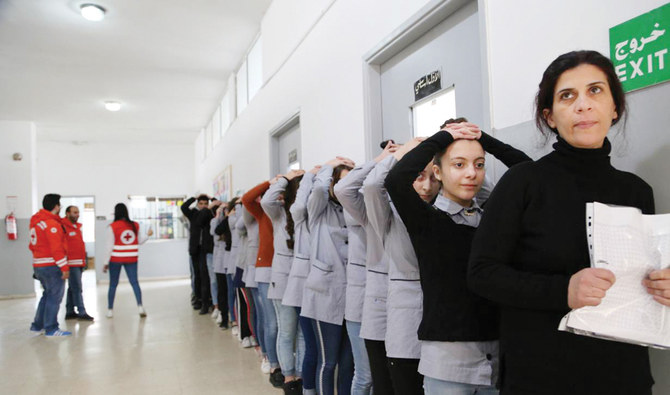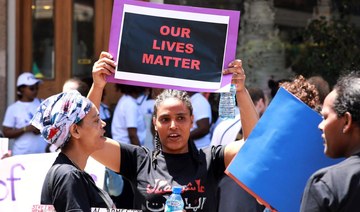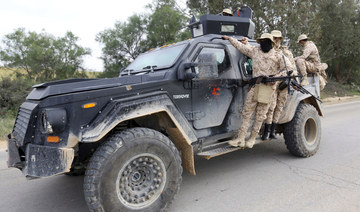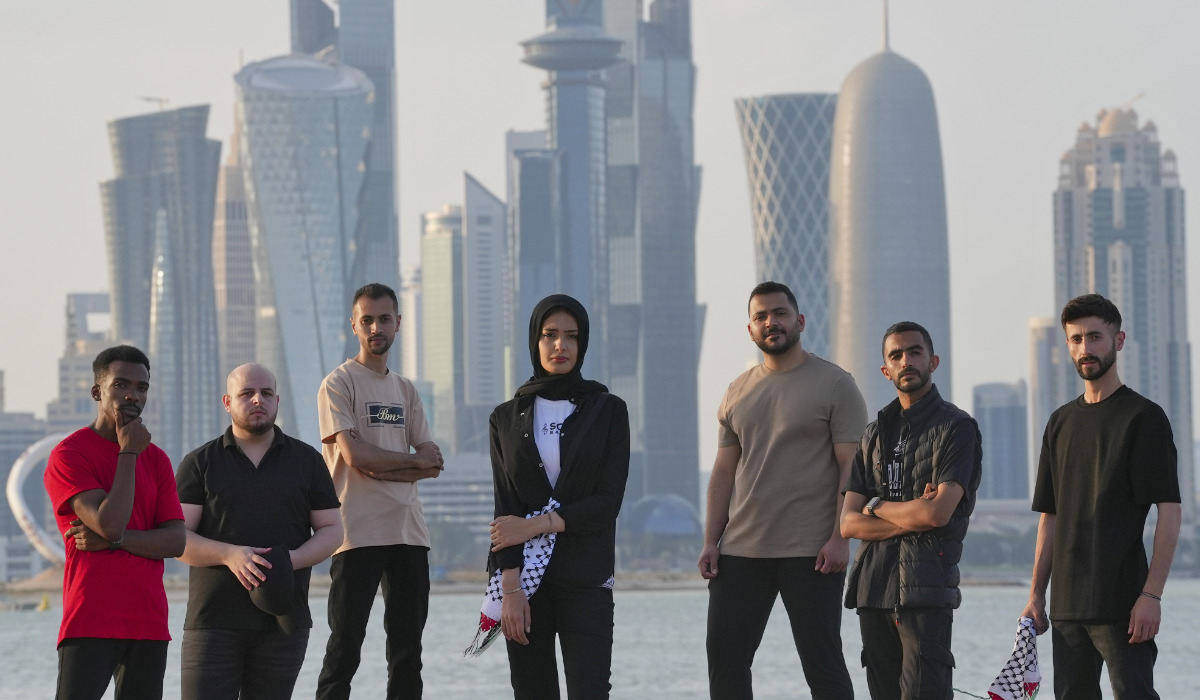TRIPOLI: For students at Takmiliyat Al Kobba 2nd School in Tripoli in northern Lebanon, getting an education used to mean risking their lives in a hail of bullets.
Pupils would dash down the exposed steps at the school, which was caught on the boundary between two warring sects, hoping to reach safety. But not all made it.
Mekdad Dergham, 8, was killed as he left the school in 2010.
“This child, for his bad luck, he was going back downstairs to go home and unfortunately he didn’t arrive. The bullet was faster than him,” school director Raghida Abdel El Hamid Chamsin told the Thomson Reuters Foundation, speaking from her office.
“I still remember he was in the third grade. Every year, I would say, ‘If he was still alive he would be in fourth grade,’ next year I would say ‘He should be in the fifth grade’.”
Now the school is working with the Lebanese Red Cross (LRC) to train children on how to stay safe during conflicts and disasters.
Around the world, people facing multiple threats, from worsening storms to violent uprisings, often are helped to deal with just one at a time, leaving them still vulnerable to others, researchers say.
But joining up preparedness efforts — as is happening in Lebanon — can save both cash and lives, they say.
In Lebanon, the war in neighboring Syria that erupted in 2011, with opposition fighters battling to topple Bashar Assad, triggered Lebanon’s worst instability since its own 1975-90 civil war.
This included several bouts of fighting in Tripoli, Lebanon’s second largest city and a historic base for fighter groups, that left hundreds dead and injured.
But as well as struggling to cope with conflict, Lebanon’s 6 million people also face natural hazards: The country is crossed by three major earthquake fault lines and is at risk of flooding, landslides, wildfires and storms.
Increasing resilience
Recent years have seen growing efforts to increase the country’s ability to cope with disasters.
A decade ago the prime minister’s office established a national disaster risk management unit, supported by the UN Development Program.
This aims to “support the Lebanese government in its efforts to reduce exposure and vulnerabilities in order to reduce the risk of disasters,” a government spokesman said in an email.
A Lebanon Crisis Response Plan was developed in 2017 with the support of international partners, aiming to protecting the most vulnerable and support stability in the fall-out from the Syria crisis.
Much of the national disaster risk management work focuses on raising awareness of hazards and increasing collaboration within a heavily sectarian society.
But schools have also been a focal point, with the government helping to develop educational materials such as a board game targeting children aged 9-15 called “If you don’t know, it’s a disaster.”
The UN Office for Disaster Risk Reduction has long argued that children should be offered disaster training, as they are among the most vulnerable in a crisis and schools often act as focal points for wider communities.
“It is very important to safeguard our future generations and ... to enhance a culture of prevention and awareness,” said the government spokesman.
Regular drills
Although fighting has died down in Tripoli in recent years, mock gunfire still rings out at Takmiliyat Al-Kobba 2nd School and about 200 other government schools during regular drills run by the Lebanese Red Cross.
During a recent armed conflict drill, students quickly evacuated their classrooms and took shelter in the school’s theater.
“I feel afraid,” 14-year-old Amal Ibrahim said after the practice. “But when I think of the steps I should do, I feel less frightened because I know how to protect myself.”
Students’ relatives are invited to learn about the drills — not least because otherwise they might risk their own lives by coming to school to try to save their children in a disaster, said Kassem Chaalan, an LRC project manager.
“In studies we did, a number of the deaths and injuries were either caused by attempts to escape or to rescue others,” said Chaalan.
The school training is also seen an opportunity to increase disaster resilience within wider communities. “You can create this culture among children at schools, and then they will be able to transfer this culture to their families,” said Chaalan.
The school training includes information on how to recognize a disaster, where to shelter, when and where to evacuate, as well as the basics of first aid and firefighting.
“When we used to hear (the) sound of bullets, we used to be too scared to know what to do. It was so confusing,” said Houssam Khaddooj, an 18-year-old former student who now volunteers with the LRC on the drills.
“If this had happened before, the area would have coped better. We would have been able to take care of ourselves, to raise awareness among those who are younger than us.”





























